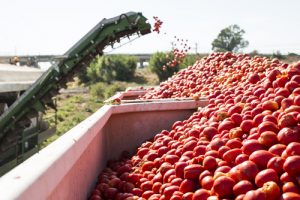
President Donald Trump announced on Monday that the United States and Mexico have reached agreement on revisions to parts of the North American Free Trade Agreement (NAFTA), while a bipartisan contingent including U.S. Reps. Carlos Curbelo (R-FL), Tom Rooney (R-FL), and Vern Buchanan (R-FL) are urging that consideration of Florida’s specialty crop industry be part of any final trade deal.
“This is something that is very special for our manufacturers and for our farmers…” President Trump said from the Oval Office, adding that he was renaming the pact the United States-Mexico Trade Agreement. Negotiations over updating NAFTA began more than a year ago between the United States, Mexico and Canada, and a final agreement with Canada has not yet been reached.
Rep. Curbelo said last week, “While we wish to continue our trading relationship with Mexico, we need to make sure the United States is receiving a fair deal, especially for our farmers in South Dade who are being taken advantage of by bad trading policies.”
Florida’s agriculture industry contributes more than 100,000 jobs and $12 billion into the Sunshine State’s yearly economy, a statement from Rep. Curbelo’s office said. Florida currently is America’s second-largest producer of fruits and vegetables and since 2000 has lost an estimated $1 billion to $3 billion annually to more imports from Mexico, according to the Florida Department of Agriculture.
“Specialty crops grown in South Florida like tomatoes, squash, eggplants, and strawberries face a significant disadvantage when it comes to Mexican competition,” Rep. Curbelo said.
Florida and Mexico have the same growing seasons and produce many of the same specialty crops, members wrote in an Aug. 23 letter sent to U.S. Trade Representative Robert Lighthizer.
However, Mexico has an unfair advantage, according to the lawmakers, because the country uses government subsidies, minus the same environment and labor standards required of Florida producers.
“As you know, an unprecedented growth in imports from Mexico as a result of its unfair subsidies and illegal seasonal dumping is having a devastating impact on farmers in our home state and throughout the Southeast,” according to the lawmakers.
“It is absolutely critical,” they wrote, “that any final agreement must allow our fruit and vegetable growers to address the challenges they face from unfairly traded imports.”
Joining Reps. Curbelo, Buchanan and Rooney in signing the letter were U.S. Reps. Ted Yoho (R-FL), Frederica Wilson (D-FL), Ileana Ros-Lehtinen (R-FL), Al Lawson (D-FL), and Mario Díaz-Balart (R-FL), among others.
The Florida members favor a U.S. proposal to use seasonal data toward determining regional relief from anti-dumping and countervailing duty cases, according to their letter.
“We need to provide this sector with the necessary tools to make the case that Mexico is selling produce at unfairly low prices when certain crops are in season in a particular region,” they wrote.
The representatives also pointed out that Congress has instructed federal trade negotiators to improve the nation’s trade laws since 2002 and as recently as 2015 through the Trade Priority and Accountability Act. And the American Farm Bureau Federation also has urged updates to a new NAFTA agreement that include “relief against the onslaught of seasonal fruit and vegetable production in Mexico,” according to their letter.
“Our industry is hurting and in need of access to adequate trade remedies that are accorded to every other sector in the U.S.,” wrote the lawmakers. “We urge your steadfast commitment to ensuring these vital trade remedies are included in any final NAFTA agreement.”



